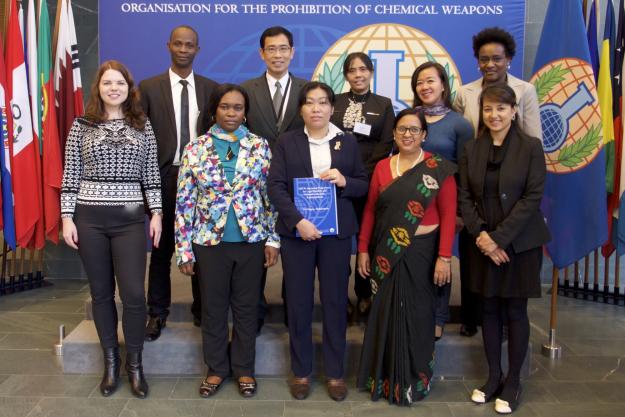
Participants at the Sixteenth Session of the Internship Programme for Legal Drafters and National Authority Representatives in The Hague.
Myanmar, Nepal and Tanzania gained specialist knowledge in drafting national legislation to implement the provisions of the Chemical Weapons Convention (CWC), at the Sixteenth Session of the Internship Programme for Legal Drafters and National Authority Representatives in The Hague from 14 – 18 November 2016.
During the five-day Internship Programme, the Implementation Support Branch (ISB) of the Organisation for the Prohibition of Chemical Weapons (OPCW) equipped participants with the skills needed to complete draft legislation that fulfils the provisions of the CWC and meets the requirements of their respective States Parties’ national legislation.
After two days of presentations on the CWC and three days of drafting sessions, each of the six participants presented their draft proposals along with a comprehensive national implementation action plan. The plan included a provisional timeline for the adoption of the CWC implementing legislation; the main stages of their national legislative adoption process; and outlined factors that could impede the process.
The participants acknowledged the significance and effectiveness of the Internship Programme for enhancing their knowledge of the CWC and the ability in drafting national legislation.
Since its launch in 2012, the Internship Programme has benefited 32 States Parties. Among these, Cape Verde, Grenada, Panama, Paraguay and Uganda have successfully enacted national legislation, while the others are at various stages of the adoption process.
The next session of the Internship Programme will take place in February 2017.
Background
As the implementing body for the Chemical Weapons Convention, the OPCW oversees the global endeavour to permanently eliminate chemical weapons. Since the Convention’s entry into force in 1997 – with its 192 States Parties – it is the most successful disarmament treaty, eliminating an entire class of weapons of mass destruction.
To date, nearly 94 per cent of all chemical weapon stockpiles declared by possessor States have been destroyed under OPCW verification. For its extensive efforts in eliminating chemical weapons, the OPCW received the 2013 Nobel Prize for Peace.
